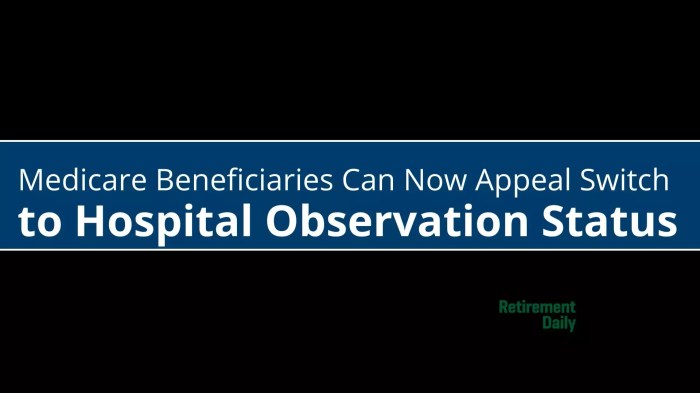Medicare beneficiaries may appeal crcr – Medicare beneficiaries have the right to appeal coverage decisions made by Medicare. This comprehensive guide provides an overview of the Medicare beneficiary appeal process, including the Coverage Reconsideration Request (CRR), Independent Review Entity (IRE), Administrative Law Judge (ALJ) hearing, and Judicial Review.
Understanding the Medicare beneficiary appeal process empowers individuals to advocate for their healthcare rights and ensure they receive the necessary coverage for their medical needs.
Medicare Beneficiary Appeal Process

Medicare beneficiaries have the right to appeal coverage decisions made by Medicare. The appeals process consists of several levels, including a Coverage Reconsideration Request (CRR), an Independent Review Entity (IRE) review, an Administrative Law Judge (ALJ) hearing, and judicial review.
Coverage Reconsideration Request (CRR)
A CRR is the first level of appeal for Medicare beneficiaries. A CRR must be filed within 60 days of receiving the initial coverage decision. The CRR is reviewed by a different Medicare contractor than the one that made the initial decision.
To file a CRR, the beneficiary must submit a written request that includes the following information:
- The beneficiary’s name, address, and Medicare number
- The date of the initial coverage decision
- A copy of the initial coverage decision
- A statement of why the beneficiary believes the coverage decision was incorrect
- Any supporting documentation, such as medical records or letters from the beneficiary’s doctor
Independent Review Entity (IRE)
If the beneficiary is not satisfied with the outcome of the CRR, they can request an IRE review. An IRE is an independent organization that reviews Medicare coverage decisions. To request an IRE review, the beneficiary must submit a written request within 60 days of receiving the CRR decision.
The IRE will review the beneficiary’s case and make a decision based on the evidence presented. The IRE’s decision is final and binding.
Administrative Law Judge (ALJ) Hearing
If the beneficiary is not satisfied with the outcome of the IRE review, they can request an ALJ hearing. An ALJ is a federal judge who reviews Medicare coverage decisions. To request an ALJ hearing, the beneficiary must submit a written request within 60 days of receiving the IRE decision.
The ALJ hearing is a formal proceeding at which the beneficiary can present evidence and arguments in support of their appeal. The ALJ will make a decision based on the evidence presented. The ALJ’s decision is final and binding.
Judicial Review, Medicare beneficiaries may appeal crcr
If the beneficiary is not satisfied with the outcome of the ALJ hearing, they can file a lawsuit in federal court. Judicial review is the final level of appeal for Medicare beneficiaries.
To file a lawsuit in federal court, the beneficiary must file a complaint within 60 days of receiving the ALJ decision. The complaint must state the reasons why the beneficiary believes the ALJ’s decision was incorrect.
Resources and Support
There are a number of resources and organizations that offer assistance with Medicare appeals. These resources include:
- The Medicare website
- The Social Security Administration
- Local Medicare contractors
- State health insurance assistance programs
- Legal aid organizations
Beneficiaries can also contact Medicare customer service for guidance at 1-800-MEDICARE (1-800-633-4227).
Frequently Asked Questions: Medicare Beneficiaries May Appeal Crcr
What is the first step in appealing a Medicare coverage decision?
Filing a Coverage Reconsideration Request (CRR) is the initial step in the Medicare beneficiary appeal process.
What is the role of an Independent Review Entity (IRE) in the Medicare appeal process?
The IRE provides an independent review of coverage decisions made by Medicare and makes recommendations to the ALJ.
What is the difference between an ALJ hearing and a Judicial Review?
An ALJ hearing is an administrative proceeding, while a Judicial Review is a court proceeding. Judicial Review is typically sought after an unfavorable ALJ decision.

